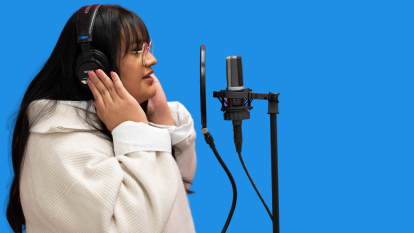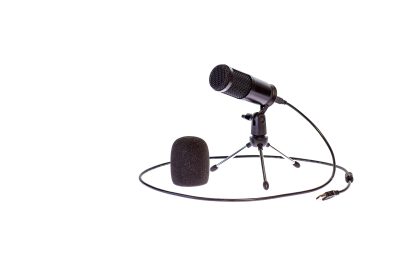 Voice Over
Voice Over
The Art of the Audition: How to Make the Most of Your Auditions on Voices
It’s great that technology has revolutionized how the voice acting world works. Voice actors primarily work from home, and submit auditions online through platforms like Voices.
Some voice actors have perfected the art of their auditions by creating a well-oiled workflow that helps them get 15 or more auditions submitted everyday. That kind of volume lends itself to higher booking averages too. That is, if the auditions are hitting the mark!
Here are the tips you need to make the most of your auditions and improve your number of booked jobs, straight from Voices Talent Manager Evan Weibe.
You do nothing else, watch the below video.
Want more? Read on!
How to Prepare for a Voice Over Audition
Here are a couple tips and tricks for a great audition, before you get started:
1. Develop Your Long-Term Strategy
If you don’t have a strategy, even a subconscious one, the audition process will be more difficult. Start developing your strategy early, articulating it to yourself or writing it down to set the bar for your VO work. Building a profitable career in anything, let alone voice over, takes consistency and dedication.
- Set a goal for the amount of auditions you will submit over the course of 4 weeks or 12 weeks even, keeping in mind that the recommended absolute minimum to be successful is 15-20 auditions per week. Many top talent will submit much more than that.
- Set a goal for the amount of demos you want on Voices, keeping in mind that top talent upload new demos each year to continue to grow and revamp their portfolio and image. If you don’t have a dozen demos or so yet, that’s a good number to aim for.
- Set a vision for the marketable niche you’ve carved out for yourself. Think of this as your elevator pitch—can you describe what is unique about what you offer to clients in 30 seconds? That’s your vision. This should be ever-evolving as well. It doesn’t happen in a vacuum or on paper—it evolves through each client transaction and each new VO opportunity. If you don’t have that elevator pitch yet, or you only half-resonate with your current one, that’s okay, it means you keep asking the question: “What problem am I solving for my clients?”
2. Don’t Read the Whole Script!
Primarily this is a tactic to save you time, but the secondary benefit of keeping your audition portion short is to protect your audio. Clients usually only listen to 5-10 seconds of your audition anyways, so we advise that you record 15-20 seconds of the script, unless there is a very good reason to include more, like long form audiobook narration for instance.
3. Don’t Underestimate Practice
If everybody could be a voice actor, they would. But beyond dedication and consistency, there’s the careful practice that helps you deliver compelling performances. Clients come to Voices to hire voice actors, not script readers. Practice the script as much as you need to reach a world-class performance. The more you audition and record daily, the less dedicated practice you’ll potentially need, but remarkable performances don’t always happen from a cold read.
4. Don’t Slate Your Audition
Slating means saying your name or offering some other preamble at the beginning of your audition. Slating is not recommended or necessary, as your name is already beside the play button for clients to see. The one scenario where slating is useful is when you give more than one take, and in those cases say “two takes” at the beginning. However, multiple-take auditions are completely optional and don’t necessarily make your audition more competitive.
Note: If you offer two takes please ensure they sound different enough from each other to merit the second take.
5. Bring Your Authentic Self
As voice over coach Tommy Griffiths says in this episode of Mission Audition, “You don’t want to sound believable, you want to be believable.”
Clients don’t want 80 auditions that all sound the same. They want variety! One way that you can stand out is to relax into your authentic self so that the audition is coming from a believable place.
6. Spend Less Time Auditioning
The ideal amount of time spent per audition is about 5 minutes on average. Some faster users will reduce that further, to around 2 minutes per audition. The shorter your “time per audition,” the more efficient you’ll be. Check out this piece on how to best manage your audition workflow.
7. Do Your Audio Quality Control
Here’s a short checklist of considerations for your audio quality control efforts:
- No room noise, echo, “boxy” sound or “faraway” sound
- No background noise, hum, or hiss in the audio
- Levels after normalizing are between -3db and -1db
Here’s a helpful video on how to set your levels.
- Recording levels are between -12db and -9db
- No plosive pops or clicks
- No clipping
- No unnatural spacing after editing, preserve the spacing of your natural speech
- Professional condenser microphones are best, avoid cheap condensers and avoid dynamic microphones.
Managing Your Audition Workflow on Voices
Did you know that voice actors who audition 7 or more times per day make up to $20,000 more per year than those who audition less than that? And, as mentioned above, many are completing 15 or more!
If completing that many auditions each day seems daunting, we’ve got you covered with these audition tips that will make managing your audition workflow a snap
Note: If you have a Voices guest profile, some of these audition workflow tips may not apply to you, as some features are only available to paying members. If you’re interested in upgrading your Voices profile, it’s simple and easy!.
Audition Tip #1: Take a look at your recording setup. Are you comfortable?
Your home studio setup has to be conducive to productivity and creativity, good performance, and good audio quality. This will look different for everyone, but the important questions to ask are:
- Does my physical setup allow for a quick startup?
- Does my physical setup allow for a comfortable 2-3hr work session?
- Does my gear/software allow for quick startup?
- Does my gear/software allow for a comfortable 2-3hr work session?
- Do I perform best sitting or standing?
- Is there anything in my setup that keeps me from doing my best work?
- Is there any issue in my audio that I can solve by changing the way I record rather than using a software plugin?
Audition Tip #2: Batching Your Work
There are different ways to batch your VO tasks, but if you aren’t doing any batching (or grouping similar tasks) find ways you can group tasks so that you can change gears at an appropriate pace and breathe life into your audition process. Between prepping, recording, audio bouncing, and submitting tasks, there may be inefficiencies that you can eliminate. One classic batching method is to record multiple auditions into the same session, and then once that is recorded, editing that larger file down to the specific job scripts and bouncing them one after the other and submitting. Take a deep dive into Toby Rickett’s process here:
Audition Tip #3 Using Filters on Voices
As mentioned in the video at the top of this post, automatically filter the jobs in your Hiring Folder so that you only see the jobs that match your preferences. For example, you may only want to see and audition for jobs that are paying $300 and up–you can adjust the filters so that you only see jobs that fall within certain criteria that you’ve selected. It makes your life easier and allows you to spend your energy and time on jobs you actually want to be hired for.
Audition Tip #4: Use Proposal Templates
Every audition needs a proposal template, and to save you time, Voices makes it easy to create your own messaging templates, which can be customized and used over and over again. Read up on how to write a polished and professional proposal that tells clients who you are and what you’re capable of.
For example, if you want to have a proposal template that’s specifically for business jobs, you can create one that will also include past clients you’ve worked with in the industry.
Writing a proposal is an important part of the auditioning process. Essentially, your proposal is like a cover letter for your job. Like any professional communication, it should greet the client by name if possible. It should also include a basic introduction about yourself, the services you offer, and your experience.
In Summary: These are the Essential Steps to Follow to Start Landing Jobs
Don’t give the client any reason to pass over you. Clients are looking for broadcast-ready audio quality, competitive loudness levels (so that you’re not quieter than everyone else), and following the directions in the job brief. If you have a wonderful performance but you are missing one of the basic requirements for the job, such as an audio issue or the wrong voice age or accent, then you’ve already given the client a reason not to shortlist you. The job of a voice talent is not just offering a great performance, it’s also avoiding all of the potential audition dealbreakers.
Happy Auditioning!



Comments
There’s a lot of bunkum talked about drinking loads of water during the day. Too much leads to the frustration of ‘moisture mouth’ … sounds unpleasant! This often produces unwanted vocal clicks and smacks, leaving you with unnecessary editing and becoming overly aware of your vocal enunciation, so limiting your creativity and expression. The trick is … don’t get thirsty. Have a decent drink half an hour before you start working and trust your body. Personally, I like an very occasional sip of green tea with a slice of lemon and dab of honey. Keeps the mouth dry and moist at the same time. Your a voice actor, not a marathon runner!
Thank you for these tips. They are very helpful.
Is it ever too late to start doing voice overs? I have never done any voice work at all. How can I tell if I’m wasting my time, or if I’m any good? I’m in my fifties and have a pleasant voice, but having never done this, I’m skeptical.
Thanks,
Pam
Hi Pam,
It is never too late to do voice overs, as there are a lot of fun projects available for every kind of voice actor.
To get started, I’d recommend signing up for a voice talent profile at voices.com/signup and completing your voice actor profile.
Happy Auditioning!
– Lubna